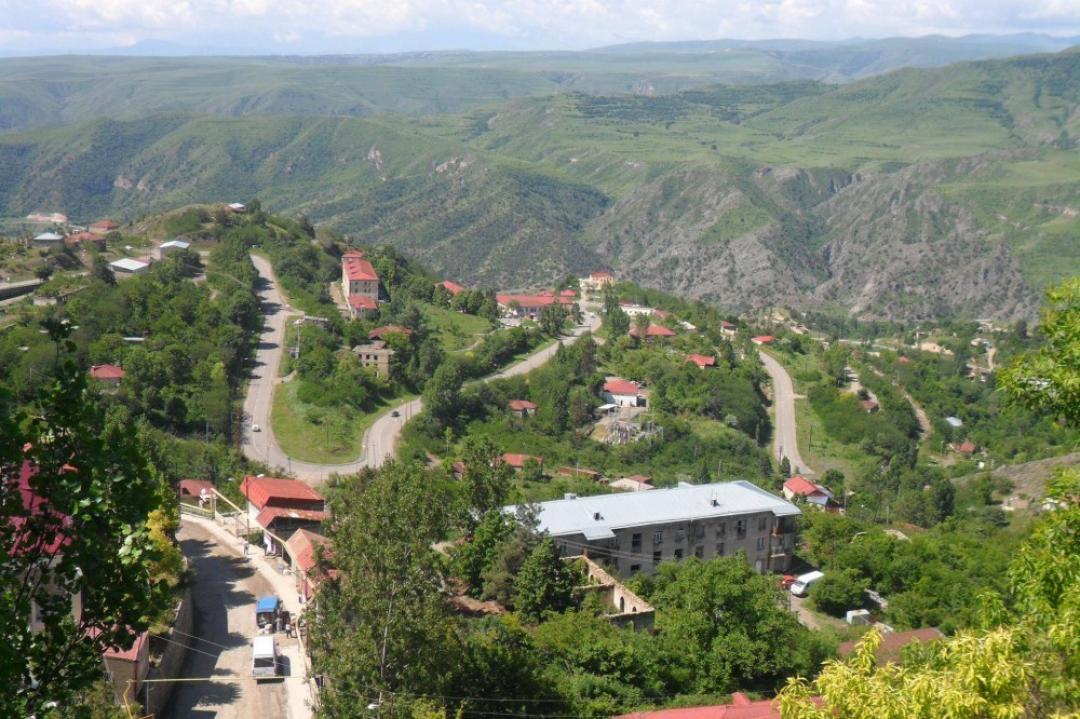
Nagorno-Karabakh: second working group meeting; Aliyev’s visit to the region; Armenian Ombudsman on gunshots in Syunik

On 15 February, Azerbaijan’s President Ilham Aliyev visited the Fuzuli, Zangilan, Lachin and Jabrayil districts of Nagorno-Karabakh to lay the foundation of the Horadiz-Aghband railway which would contribute to the establishment of a direct railway connection between the main part of Azerbaijan and the Nakhchivan Autonomous Republic.
“We said that transport projects play a special role in the long-term development of the region, ensuring stability and reducing military risks to zero. All the countries participating in them will only benefit from that,” Aliyev stated. “At the same time, a railway line from Russia to Armenia may be opened. This line can only pass through the territory of Azerbaijan. In addition, a railway communication will appear between Russia and Iran through the territory of Nakhchivan. There will be a railway connection between Iran and Armenia. A railway link will be created between Turkey and Russia. In other words, all countries of the region will only benefit from this,” he further underscored.
The Azerbaijani President spoke also on other projects, emphasising that the first “smart village” in Nagorno-Karabakh would be built in the village of Aghali in the Zangilan district. The project will be implemented in the village on a total of five areas, namely: housing, manufacturing, social services, “smart agriculture” and alternative energy.
However, Aliyev’s visit to the region did not go without inflammatory rhetoric towards Armenia. “Revanchist forces are trying to raise their heads in Armenia even today. They are trying to threaten Azerbaijan with more provocations and another war. They must understand that we are paying attention to everything, that we keep everything under control and will never allow Armenian fascism to raise its head again,” he stated. “We have destroyed Armenian fascism. We drove out the enemy out of our native lands, threw it out of here. It is safe to say that we have destroyed the Armenian army. There is no Armenian army. It has been defeated. There is neither equipment nor manpower left. They have acknowledged that they had 10,000 deserters during the war. There was not a single deserter in the Azerbaijani army. This testifies to the high morale of our people and our army. This is a manifestation of the current policy. We won victory on the battlefield,” Aliyev added.
A day earlier, the working group of the Azerbaijani parliament on inter-parliamentary relations with the US Congress published a statement, which contained a response to a letter from several American senators who demanded that President Joseph Biden take measures against Azerbaijan and Turkey. “Most US senators have never expressed concern about the policy of ethnic cleansing conducted by Armenia against the Azerbaijani people, the expulsion of hundreds of thousands of people from their native lands, gross violations of human rights, the destruction and plundering of villages, cities, the ancient and rich cultural heritage of the Azerbaijani people during the occupation,” said the Azerbaijani parliamentarians, adding that many American senators also did not condemn the massacres of Azerbaijanis and the war crimes of the Armenian Armed Forces.
“It is unacceptable for US senators to blame Azerbaijan for the settlement of the conflict, which has restored its territorial integrity. Such statements do not serve peace and security in the South Caucasus region, but can push the existing radical and revanchist forces in Armenia to a new escalation of the situation. It is unfair to criticise Turkey for its political and moral support for Azerbaijan's just struggle based on the norms and principles of international law. The growing politicisation of human rights is a matter of serious concern. Senators’ attempts to interfere in the internal affairs of a sovereign state, such as Turkey, are unacceptable,” the letter further stressed.
On 12 February, the second meeting of the trilateral working group, consisting of the deputy Prime Ministers of Armenia (Mher Grigoryan) Azerbaijan (Shahin Mustafayev) and Russia (Alexey Overchuk) took place. According to official information, the deputy prime ministers discussed the activity that stems from the implementation of the 9th point (reopening of all transport links in the region) of the trilateral statement. They also discussed the implementation of points 2,3 and 4 of the statement. The press service reported that the sides agreed upon a timetable for further work. Earlier, Grigoryan ordered the creation of two Armenain expert subgroups to deal with the practical modalities of reopening transport links. The subgroups would comprise of representatives from the National Security Service, the Ministry of Foreign Affairs, the Ministry of Economy, the Ministry of Territorial Administration and Infrastructure, as well as the State Revenue Committee and the Food Safety Inspectorate.
Meanwhile, in Armenia, the country’s Ombudsman Arman Tatoyan presented a video showing Azerbaijani soldiers using weapons of various calibre to fire in the immediate vicinity of the Armenian villages in the southern region of Syunik. According to Tatoyan, the shots were fired two days ago, at different times of the day, between the villages of Agarak and Yeghvard of the Kapan community. The video was filmed by Armenian border guards. He said that he periodically receives alarming reports from the residents of the neighbouring villages of Kapan about regular shooting by the Azerbaijani military.
Tatoyan’s statements were afterwards refuted by Armenia’s Defence Ministry, which stated that the operational situation along the entire length of the Armenian-Azerbaijani border on 14-15 February did not change with no border incidents being reported. “In some parts of the border zone, indiscriminate shots were recorded, mainly in the air, which did not affect the operational tactical situation,” the statement stressed.
See Also


Yerevan Balances Strategic Ties with Both US and Russia, Says Foreign Minister

FM Mirzoyan: Peace Deal with Azerbaijan Is Within Reach

Pashinyan and Erdogan Hold Call, Reaffirm Commitment to Ongoing Dialogue

Ilham Aliyev and Masoud Pezeshkian Discuss Development of Bilateral Relations

